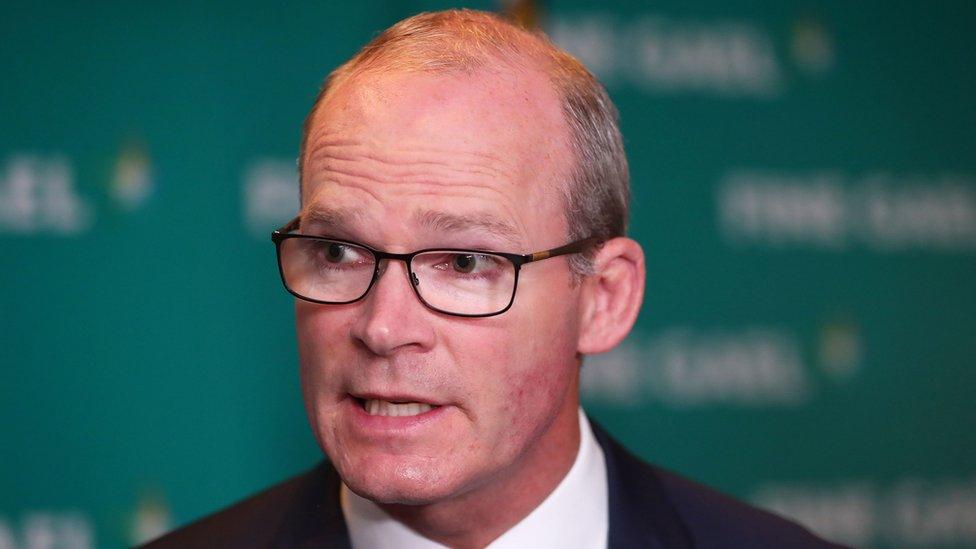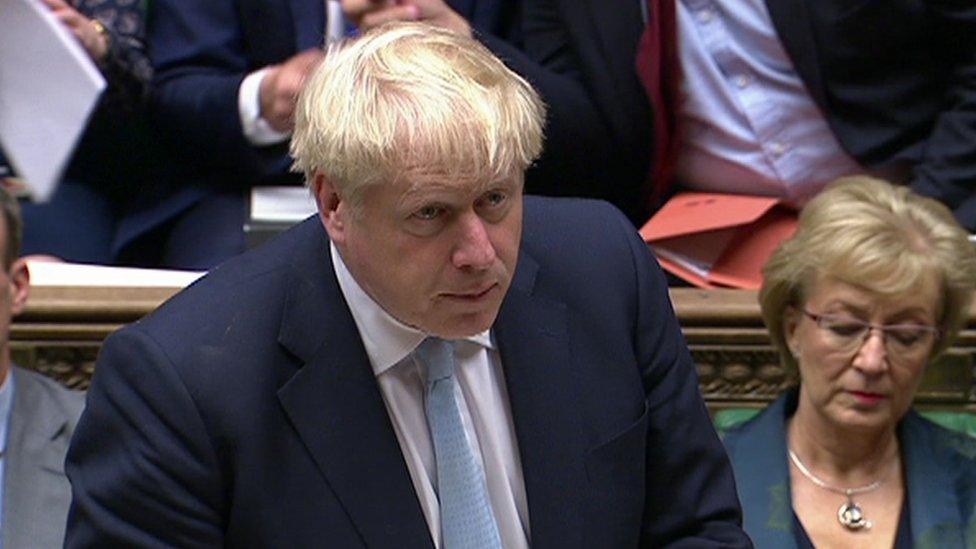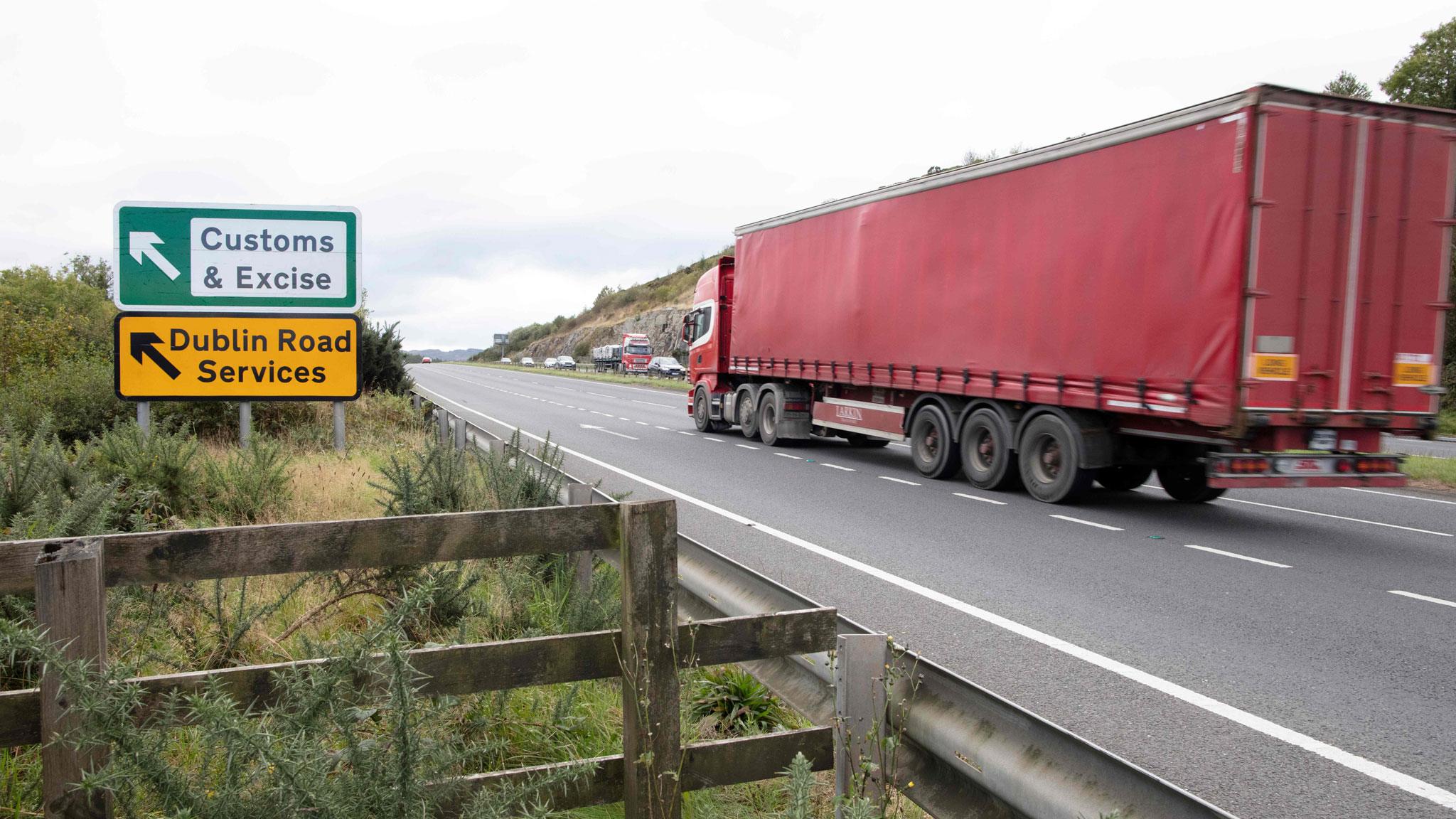Brexit: 'It will be no-deal if plan is final offer'
- Published

Simon Coveney said there were 'fundamental problems' with the latest Brexit proposals
There will be no deal if the latest Brexit plan put forward by the UK is the "final proposal", Irish deputy prime minister Simon Coveney has said.
The UK's offer to the EU would replace the Irish border backstop through a number of different arrangements.
The Irish government is concerned about customs checks and a review mechanism for the devolved NI government.
DUP leader Arlene Foster described Mr Coveney's remarks as "deeply unhelpful" and "obstructionist".
Speaking on Thursday, Mrs Foster said she believed the Irish government was not interested in an alternative to the backstop.
The Irish deputy prime minister said giving Stormont a say on a single market deal coming into force could not be approved.
UK Prime Minister Boris Johnson's plan would see Northern Ireland stay in the European single market for goods but leave the customs union - resulting in new customs checks.
Although the proposals were welcomed by the DUP, other political parties in Northern Ireland and business groups have dismissed it.
Stormont's power-sharing government is currently not sitting - it collapsed two-and-a-half years ago amid a bitter row about a green energy scheme.
Allow X content?
This article contains content provided by X. We ask for your permission before anything is loaded, as they may be using cookies and other technologies. You may want to read X’s cookie policy, external and privacy policy, external before accepting. To view this content choose ‘accept and continue’.
Speaking on Thursday, Irish PM Leo Varadkar repeated the Irish government's stance that the plans "fall short in a number of aspects".
Mr Varadkar said he was "reassured" by comments made by Mr Johnson that there would be no physical infrastructure at the Irish border.
However, he said that pledge appeared to contradict the text of the UK plan, which indicated checks could be carried out at unspecified designated locations.
There was a need to "tease out" the detail of the customs proposals, he said.
Responding to his comments Mrs Foster said: "The Irish prime minister will go down in history as the man that instituted a hard border on the island of Ireland. I think that's really regrettable and I'm sad about that."
'An effort'
The UK is due to leave the EU on 31 October, unless a deal is reached or the EU grants a further extension, if the UK requests it.
Mr Coveney was speaking in the Dail (Irish parliament) on Thursday, as Boris Johnson set out his proposal for MPs in Westminster as a "genuine attempt to bridge the chasm" with the EU.
He said he believed the prime minister did want to reach a Brexit deal, and that the latest offer was an "effort" to move the UK and EU in the direction of a deal - but there were "fundamental problems" with it.
Government "has proposed a new deal for Northern Ireland"
Under Mr Johnson's proposals, Northern Ireland would leave the EU's customs union alongside the rest of the UK, at the start of 2021 - but Northern Ireland would, with the consent of politicians in the Stormont Assembly, continue to apply EU legislation relating to agricultural and other products.
The consent of Northern Ireland's politicians would have to be sought every four years.
"If that is the final proposal, there will be no deal," Mr Coveney said.
He said the Irish government and the EU could not approve the plan to give the Stormont Assembly a say on whether to allow that single market arrangement to come into force.
'Real problem'
"We cannot support anything that suggests one party, indeed the minority in Northern Ireland, could make the decisions for the majority," he added.
There has been concern from nationalist parties at Stormont that it could be used as a unionist veto, as a cross-community vote would be needed at Stormont before EU regulations could continue to be followed.
Mr Coveney also criticised the UK's proposal to leave the EU customs union as a whole.
"Despite the paper saying they want to avoid customs checks, it raises the prospect of customs points somewhere, not just premises and businesses - and we think that's going to be a real problem."
Mr Varadkar is due to speak to Mr Johnson next week, as both UK and EU officials continue discussions.
- Published3 October 2019

- Published2 October 2019
